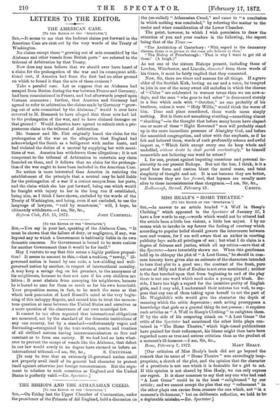[TO THE EDITOR OF THE " SPECTATOR:1
Six,—You say in your last, speaking of the Alabama Case, " It must be shown that the failure of duty, or negligence, if any, was beyond any to which a Government is habitually liable in its own domestic concerns. No Government is bound to be more zealous for another Government than it would be for itself."
May I venture to say that this seems a highly perilous proposi- tion? It seems to amount to this,—that a reckless, "rowdy," ill- governed nation is bound by one code, a law-abiding and well- governed nation by another, in respect of international morality. A may keep a savage dog on his premises, to the annoyance of his neighbours, because he does not care if his own children are bitten ; B must abstain from annoying his neighbours, because he is bound to care for them as much as for his own household. Your proposition seems, in fact, to be much the same as that which took possession of Lord Russell's mind at the very begin- ning, of this unhappy dispute, and caused him to treat the momen- tous question at issue between the United States and ourselves as a mere question of the observance of our own municipal law.
It cannot be too often repeated that international obligations are measured, not by the standard of the domestic institutions of any one country, but by a standard—unfortunately vague and fluctuating—recognized by the text-writers, courts, and treatises of all civilized nations having intercommunication so free and constant as to form one society. If we had had no laws what- ever to prevent the escape of vessels like the Alabama, that defect in our law would surely in no degree have excused us before an international tribunal.—I am, Sir, &c., S. ClIEETHAM.
[It may be true that an extremely ill-governed nation could not properly avail itself of its general bad character to protect itself against otherwise just foreign remonstrances. But the argu- ment in relation to such countries as England and the United States is perfectly valid.—En. Spectator.]


































 Previous page
Previous page